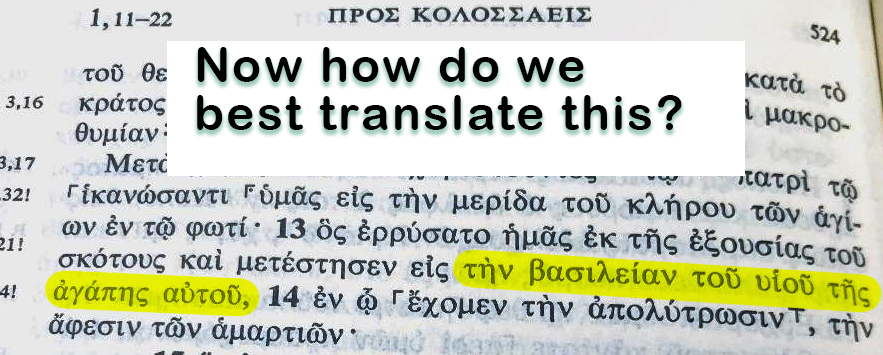
The Point: Colossians 1:13b is a unique phrase in all of Scripture. Wow! For this reason, however, translators aren’t quite sure what to do with it. As you read below, you will see my reasons for suggesting that all of the translations capture a portion of this segment, while only an exactly literal translation captures the totality. Jesus is the embodiment, the exact image, of everything anyone could ever say about the love of God. Christ is the object of God’s love, as well as the subject. He is the recipient as well as the giver. Everything we know about Christ reveals (expresses) the love of God his Father, both for Christ and from Christ and towards us, his people. (Disclaimer: It gets a bit technical, so that is why I’ve summed it all up here as, “The Point.”)
Most translations of Colossians 1:13b read, “kingdom of his beloved Son,” as in the ESV, or, “kingdom of the Son he loves,” as in the NIV and NET. Alternatively, both the NKJ and and the much older ASV (1901) read, “kingdom of the Son of his love.” The interlinear, literal translation portion of Marshall’s Greek-English New Testament reads, “kingdom of the Son of the love of him,” an exact correspondence with the Greek. My thesis is that the translation, “Son of his love,” though older, still recommends itself as a strong possibility based on evidence from context and comparison with the Greek structure of other biblical verses concerning God’s love and his Son.
The phrase in Colossians 1:13b reads in Greek, “τὴν βασιλείαν τοῦ υἱοῦ τῆς ἀγάπης αὐτοῦ.” This phrase is unique to the entire Bible, as well as the portions that read, “τοῦ υἱοῦ τῆς ἀγάπης,” and “τῆς ἀγάπης αὐτοῦ.” The phrase “his beloved Son” in English translations, including the ESV, NAU, and “dear Son” in the KJV, occurs only in Colossians 1:13. The English phrase Son he loves occurs only in Colossians 1:13. That this Greek construction is so unique accounts for the imprecision in its translation.
The English phrase “my beloved Son” occurs nine times in the KJV and seven times in the ESV. The corresponding “my Son, whom I love” (NIV) occurs eight times, all in the New Testament, and only in the NIV. The Greek construction corresponding to “my beloved Son” differs entirely from the Greek construction of “the Son of his love.” “My beloved Son” with a capital “S” is “ὁ υἱός μου ὁ ἀγαπητός” in six of the seven instances of its occurrence in the Bible, all of which occur in the New Testament (1). There is also one occurrence of the same construction in the accusative (Luke 20:13). “The Son of his love” in Greek, as noted above, is “τοῦ υἱοῦ τῆς ἀγάπης αὐτοῦ,” and also as noted above, is unique to all of Scripture.
In the genitive, the Greek word for love, “ἀγάπης,” occurs twenty-one times in the Bible, three of these in the Septuagint and the remaining eighteen in the New Testament. Two of the Septuagint references occur in Song of Solomon and the third in Jeremiah. All of the New Testament occurrences are in the epistles. Of all the occurrences of “ἀγάπης,” the one in Colossians 1:13 is the only one that occurs in close proximity to mention of Christ as God’s Son. Of the eighteen New Testament occurrences of the phrase “ἀγάπης,” only that in 2 Corinthians 13:11, “ὁ θεὸς τῆς ἀγάπης καὶ εἰρήνης,” displays a structure similar to the phrase in Colossians 1:13, “τοῦ υἱοῦ τῆς ἀγάπης αὐτοῦ.”
Wallace in Greek Beyond the Basics (107) identifies 2 Corinthians 13:11 as a possible example of a genitive of product, that is, a product which is produced by the head noun. If this is so, then the phrase could be translated as, “the God who produces love and peace,” which suits the context nicely. Since the Greek phrase in 2 Corinthians is the only phrase in all of Scripture that uses ἀγάπης in a structure similar to that found in Colossians 1:13–and both verses are Pauline–it appears reasonable to consider that the genitive in Colossians might carry a meaning similar to the one found in 2 Corinthians. If this were the case, the translation might read, “the Son who produces his [the Father’s] love.”
There is another quite different sense for the phrase, “of the Son of his love,” a sense which is also rare in Scripture. The phrase “the son who is characterized by such-and-such a quality,” captures the essence of this further meaning. Illustrations are found in John 17:12 and 2 Thessalonians 2:3, where the phrase in question is, “the son of destruction,” or, “ὁ υἱὸς τῆς ἀπωλείας.” Acts 4:36 provides another example in the phrase “son of encouragement,” or “υἱὸς παρακλήσεως.” Such a meaning for “τοῦ υἱοῦ τῆς ἀγάπης αὐτοῦ,” or paraphrased, “of the Son who is characterized by and embodies the love of the Father,” fits well with the meaning of the entire verse in which the domain of darkness is contrasted with the kingdom of the Son of God, who is characterized by and embodies the Father’s love.
Summary: For all of the above reasons, I prefer to translate Colossians 1:13b as, “He delivered us from the power of darkness and transferred us to the kingdom of the Son of his love. (Colossians 1:13 NET, except for the underlined portion)
_________
1 The seventh KJV occurrence of “my beloved Son” occurs in Luke 9:35. It is ὁ υἱός μου ὁ ἐκλελεγμένος, or my Son, the chosen One.
